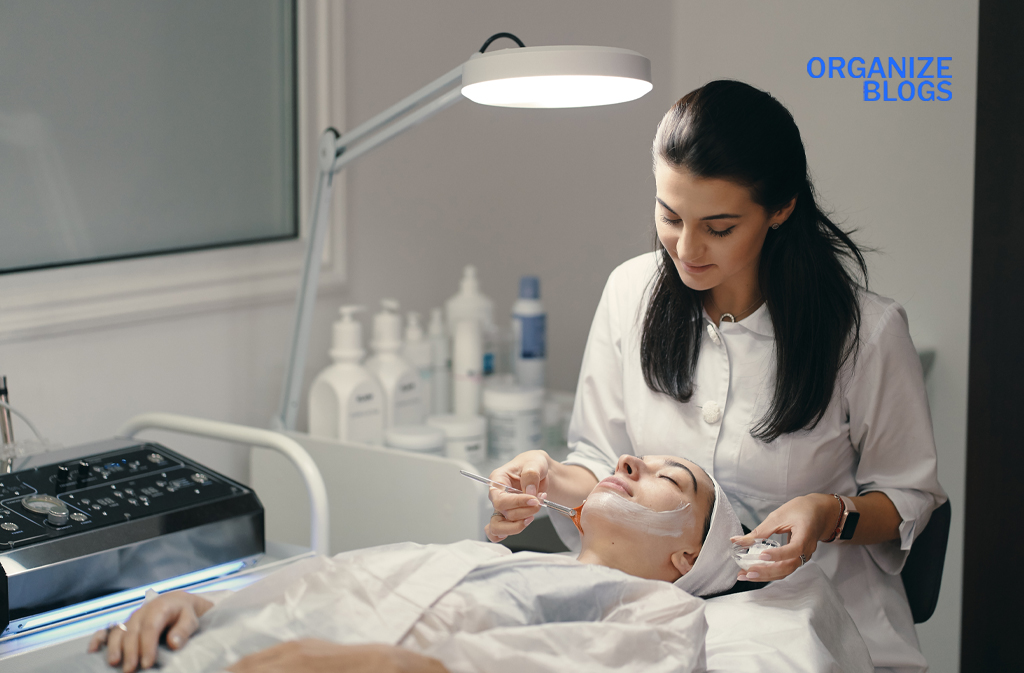Esthetician is a word you may have heard at a spa or salon. But what does it really mean? Simply put, an esthetician is a skincare professional who helps people take care of their skin. Whether it’s giving facials, massage, or removing unwanted hair, this job is all about helping others look and feel their best.
In this article, you’ll learn all about what estheticians do, how to become one, and why they are so important in the world of beauty and health. If you love skincare, enjoy working with people, and want to explore a rewarding job, becoming an esthetician might be right for you.
Table of Contents
What Does an Esthetician Do Every Day?
An esthetician works to improve skin health. That means they provide skin care treatments like deep cleansing, facials massage, and chemical peels. These services can help people feel more confident about their skin.
In addition to making people feel good, estheticians also educate their clients. They share helpful tips for dealing with skin conditions like acne or dry patches. Because of this, many clients return regularly for ongoing care and advice.
Common Treatments Offered
Estheticians can offer many different services depending on where they work and their training. For example, most are skilled in makeup application, hair removal, and body treatments. These services are popular because they help people feel refreshed and pampered.
Some estheticians also perform more advanced procedures like chemical peels or microdermabrasion, which help improve skin texture and tone. With advanced training, estheticians may even work with medical professionals to help clients with more serious skincare needs.
Where Do Skincare Specialist Work?
Estheticians can be found in many different places. Most work in spas or salons, but others are found in medical offices or luxury resorts. In fact, many estheticians enjoy flexible schedules and get to work in relaxing environments.
Some estheticians also choose to open their own skincare studios. Others become mobile, bringing treatments to people’s homes. Because there are many choices, working as an esthetician can be both fun and flexible.
How to Become an Skincare Specialist
To become an esthetician, you must first have a high school diploma or GED. After that, you’ll need to attend a program at one of the state-licensed cosmetology schools or beauty academies. There, you’ll learn everything from skin care treatments to safety and sanitation.
Once you complete the training, most states require you to pass a licensing exam. This test includes both a written part and a practical part, where you show your skills. After passing, you are officially a state licensed esthetician!
Why Skin Health Matters So Much
Skin is the body’s largest organ, and it protects us every day. That’s why skin health is so important. Its help people take better care of their skin so it stays clean, healthy, and glowing.
Sometimes, people suffer from skin conditions like acne, rosacea, or uneven skin tone. Skincare Specialist know how to care for these issues and help improve them. By using the right products and treatments, they give people confidence and comfort.

Skills Every Esthetician Should Have
An esthetician needs more than just training. They also need to be caring, kind, and great at talking to people. Since estheticians work closely with clients, having strong communication skills is very helpful.
In addition, estheticians must be detail-oriented and gentle. Whether it’s removing unwanted hair or giving a relaxing facial, every touch matters. The best Skincare Specialist also stay curious and keep learning about new beauty trends and techniques.
What You Learn in Cosmetology Schools
In cosmetology schools, students who want to be estheticians learn about facials massage, skincare tools, body treatments, and more. These programs often include hands-on practice, so you get to try everything in a safe, supervised setting.
You’ll also study topics like skin types, chemical peels, infection control, and even customer service. All these lessons help you become a trusted skincare professional who can help people feel better inside and out.
Esthetician vs. Dermatologist: What’s the Difference?
It’s easy to mix up with dermatologists, but they are quite different. A dermatologist is a doctor who can treat serious medical issues, while an esthetician focuses on beauty and wellness through non-medical care.
For example, if someone has mild acne, an Skincare Specialist can suggest a gentle treatment. But if someone has skin cancer or another serious issue, they must see a medical professional like a dermatologist. Still, both careers work to improve skin health in different ways.
Job Outlook and Salary Expectations
The demand for estheticians is growing fast. According to the Bureau of Labor Statistics, jobs for skincare specialists are expected to grow faster than average. This is great news for anyone thinking about a career in skincare.
Salaries vary depending on where you work and how much experience you have. However, many estheticians earn tips or extra income from product sales. As you grow your skills and build loyal clients, your earnings can increase too.
Skincare Specialist in Medical Settings
Some Skincare Specialist choose to work with medical professionals in clinics or medical spas. In these places, they may help patients who need licensed skincare support after surgery or for skin conditions like scarring or pigmentation.
These roles usually require advanced training, but they also offer the chance to work with doctors and nurses. It’s a great path for estheticians who want to go beyond beauty and focus more on healing and restoration.
Final Thoughts
Becoming an esthetician is a great choice for people who love skincare, enjoy helping others, and want a career that makes people feel happy and confident. It offers flexibility, creativity, and many ways to grow professionally.
Whether you dream of working in a spa, opening your own studio, or joining a medical team, the path of an Skincare Specialist can be rewarding. With the right education, a kind heart, and a strong work ethic, you can succeed in this exciting and beautiful career.

FAQs
Q1: How long does the training take?
Most skincare training programs take between 4 to 12 months to complete, depending on your state and whether you attend full-time or part-time.
Q2: Do I need a license to work in this field?
Yes, nearly every U.S. state requires you to be licensed after completing a certified beauty or skincare program and passing a state exam.
Q3: Can I work in a medical setting after getting certified?
Yes! Many professionals with additional training find work in medical spas or dermatology clinics, often alongside healthcare providers.
Q4: What’s the difference between this and cosmetology?
Cosmetology includes hair, nails, and skincare, while this path focuses only on skin treatments, facials, and hair removal services.
Q5: Is this a high-demand career?
Absolutely. The Bureau of Labor Statistics shows a strong growth rate for skin care professionals, with new job openings increasing every year.
Visit our website: Organize Blogs

